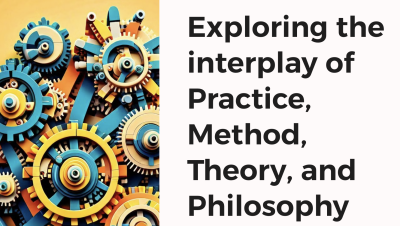A recent conversation with Dr Colin Benjamin started out with me asking this somewhat naive question. "What's the difference between a practice, and a method?" Colin is variously described as a genius, or a mad man. He also happens to be my Dad. We oft end up in discussion and debate as I ask him questions, a practice I started as a toddler, and have continued to refine throughout my life to date.
As product owner and maintainer of the Open Practice Library (OPL), I've thought a lot about the definition of practice we use in our editorial style guide
What is a practice? A practice is an activity that helps teams achieve specific goals. It's not just an idea; it's something that you do.
Tim Beattie, one of the founders of the OPL has found "Method" to be a better word for his purposes, and it is this that got me thinking about whether or not the words are truely synonyms, or if there may be some fundamental difference between them.
Colin, as always, took the idea further by adding Theory, and Philosophy to the mix. So, I'm now beginning to formulate these four parts like this:
- Practice. Something I do, again and again, to achieve an end. I improve, I perfect, I tweak. I do.
- Method. Describe the thing so others can do it too. Break it down, show the steps, list the ingredients necessary for practice.
- Theory. Why we practice, how we practice, and the context in which the practice is useful, and awareness of the conditions and associated knowledge for ensuring safe execution of the practice.
- Philosophy. Thinking, analysing, critiquing the practice, method, and theory within and beyond its obvious context, further exploring questions of value, ethics, and applicability.
So I've also been experimenting with exploring these ideas further with gamma.app's AI assistant.
Or something? What do you think? How else might they inter-relate? I'm still looking for relevant references to expand my appreciation and thinking about all this.
Benjamin, Colin. (2024). P M Θ and Φ -search for author, LinkedIn.
Stetsenko, Anna. (2016). Vygotsky’s theory of method and philosophy of practice: Implications for trans/formative methodology. Educação: Revista quadrimestral. 39. 32-41. 10.15448/1981-2582.2016.s.24385.
Abstract: Vygotsky's project needs to be grasped as a yet unnamed type of an approach which, in continuing the revolutionary spirit of Marxism, moved beyond the old divide between theory and practice and instead, embodied their unity in a peculiar blend with distinct philosophical, theoretical and ethical/ideological underpinnings. The goal of creating new psychology for a society that itself needed to be created on principles of social justice and equality guided this approach and turned it into a critical-practical project of social transformation and change. The main argument advanced in this paper is that at the core of Vygotsky's method is the novel transformative onto-epistemology, coupled with the socio-political ethos of equality and justice, which challenge ideology of adaptation and control. I discuss this set of issues in light of a transformative activist stance that puts premium on researchers' commitments and value orientations.
Keywords: Vygotsky.Transformative activist stance. Social justice. Ideological-political work. Formative method.

